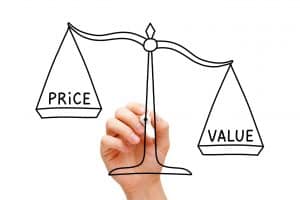Time To Read: 11 minutes
Hearing aids are expensive, but their value is worth so much more. We investigate:
- Advanced technology
- Research and Development
- Low volume, higher price
- Designed for the individual
- Getting the best price and value
- Aftercare
- Intangible benefits
There’s no getting around it. Hearing aids are expensive.
Depending on the level of technology, the price difference between base models and the top of the line can be many thousands of dollars.
It’s no surprise that people ask the question - why are hearing aids so expensive?
There are a number of different factors for that. But there is good news - there are things you can do to ensure you get the best possible value from getting hearing aids.
Let’s take a look at some of the reasons why hearing aids prices can be so high.
Advanced technology in miniature, built to survive electronics-unfriendly environments
Hearing aids are tiny technological marvels. They contain microphones (sometimes more than one), amplifiers and receivers. They also contain computer chips with different channels and settings to maximise hearing potential.
New hearing aids have additional functionality such as Bluetooth which requires additional computer processing power.
And they are all made to survive the heat and moisture that the body generates.
Research and Development
 The world’s hearing aid manufacturers invest substantial time and money in research and development to build better and more sophisticated hearing aids year after year.
The world’s hearing aid manufacturers invest substantial time and money in research and development to build better and more sophisticated hearing aids year after year.
They also invest in medical research to better understand the nature of hearing and hearing loss. That investment cost millions and is funded through the sales of their product.
Low Volume, Higher Price
Some people note hearing aids carry much the same technology as mobile phones, which are much cheaper. But that doesn’t compare apples with apples.
According to Statistica, there are 19.4 million mobile phone users in Australia. This compares to 3.6 million hearing aid users in Australia.
This means more than five times as many people have mobile phones as wear hearing aids. This is a demonstration of economies of scale - the more goods sold, the cheaper they tend to be.
Each Hearing Aid Is Individual
Hearing aids aren’t ‘plug and play’ devices straight out of the box. Each one has to be particularly programmed for your type of hearing loss.
Treating hearing loss is not simply a matter of indiscriminately making all sounds louder. It’s about improving your ability to hear ‘lost’ frequencies that help you discern speech-in-noise and other important sounds.
This level of individual client attention, from fitting to follow-up and beyond, is another reason why hearing aids appear to be disproportionately expensive compared to other consumer electronics.
All of these factors are outside the power of the individual to do anything about. They are what they are. However, there are aspects of the cost of hearing aids that are definitely in the hands of consumers.
Important to note:
If you need hearing aids, get hearing aids. Don’t be fooled by substantially cheaper devices, that merely amplifies sound across all frequencies, and think you’re doing the best for your ears.
You may be delaying in getting a truly effective solution and risk possible exacerbation of your hearing loss.
How You Can Get The Best Price And The Best Value Hearing Aids
In Australia, hearing aid pricing is not regulated. That means it pays to shop around and ask a few questions to get the best possible value (and the best price).
Where You Buy Makes A Difference
Bigger doesn’t necessarily mean better. Large chains also have large overheads, such as shopping center rent and staff wages. That is reflected in the margins they have to achieve for each sale - which impacts the prices they charge you.
Some retailers are owned by the hearing aid manufacturer which means less competition in terms of products offered, and less incentive to be keener on price. Others are owned by overseas companies so the retailer’s first responsibility is to provide profit to the parent company.
Best Price
There are two steps to take to ensure you’re getting the best possible price:
- Get three quotes for each make and model you’re offered. You might be surprised by the different prices you’re offered.
- Understand the features of different hearing aid brands and models, so you are only buying what you need - not what you’re being sold.
Best Value
Once you’ve obtained the best price, your next step is to choose a provider who is going to provide you with the best value.
Ask what’s included in the price of your hearing aids and look out for hidden extras charges. Will there be a fitting fee? Are consumables, such as batteries included?
Have you actually been recommended the best hearing aid for you?
Look for quality aftercare
It is important to know what services, consumables and warranties are offered with your hearing devices if you are trying to compare prices.
More importantly, is the clinic providing proactive aftercare? Or do you have to let them know if you have issues? Do they have a clearly defined client journey?
You can read about a well-defined client journey here.
The biggest issue with a client-led aftercare process is that many people do not notice as their hearing aid slowly deteriorates in performance.
This could result in your expensive hearing aid ending up in a drawer, as it isn’t working, rather than in your ear. At best, it can lead to a using suboptimal functioning hearing aid for longer than you need to.
Remember, hearing aids work on the brain rather than fixing the ear. Your brain adjusts to what you give it and may lose connection if you aren’t properly stimulated.
Consistent aftercare with active recalls is ALL about getting the best possible outcome for you over the long term.
A place that offers unlimited visits without active recalls means very little, as the clinic is hoping you will be like most consumers, and not complain until things have been really bad for a long time or, worse still, simply give up on your hearing aids and not bother calling them.
Check if the clinic you are considering has any proactive programs in place to ensure your ongoing satisfaction with your hearing devices.
A six-monthly hearing instrument check with the clinician is a good idea at the very least, and your devices can be adjusted at this time if there is any change to the performance or your hearing.
Some clinics offer six monthly over-the-counter servicing. This is not as beneficial or valuable as six monthly clinical consultations where the hearing aid performance is actually measured.
Get The Full Warranty
Ensure you get the full warranty for your hearing devices or look around for a better deal.
The standard set by hearing aid manufacturers is typically three years. This may not always be passed on to you or it may have been negotiated down when deals are being brokered between hearing aid clinics and hearing aid manufacturers.
One year warranty equals about $150 per aid in value.
Some companies also offer a number of hearing aid batteries, consumables, or hearing device drying kits. Take all of this into consideration when you decide how client-focused the hearing aid clinic is and when comparing prices.
And then there are the intangible benefits
Hearing aids should give three to five years of trouble-free working life. If you’re wearing them for maximum benefit that is, around ten hours a day or more, it doesn’t take much calculation to realise that hearing aids provide a lot of value for money.
And then there are the benefits which are less quantifiable in dollars and cents:
- Improved quality of life
- Better self-image
- Greater enjoyment of life
- Better social life
- Greater independence
- Improved work performance
- Longevity in the workplace
- Opportunity for better earning potential
- Better health
- Lessen the risk of anxiety and depression
- Lessen the risk of dementia
The truth of the matter is, hearing aids are so much more than the sum of their computer chip parts, and the value they can add to your life is priceless.
